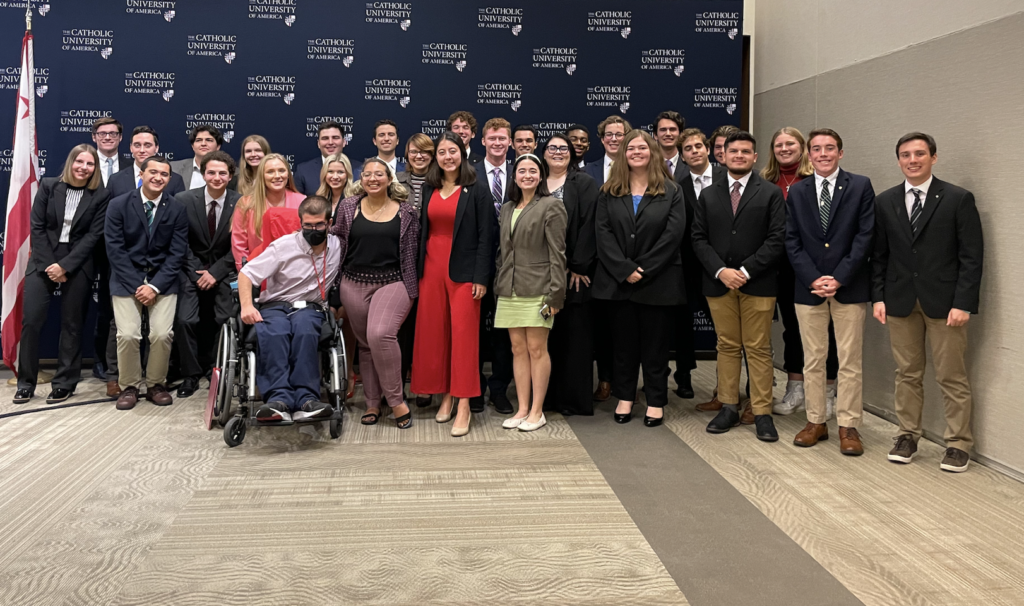Three Resolutions Passed at Lastest SGA Meeting

Image courtesy of The Catholic University of America
By Chanel Cole and Margaret Adams
On October 24 in Heritage Hall, VP Fahey hit the gavel, signifying the beginning of yet another Senate meeting. Roll call was conducted and all senators were in attendance except Senators Downing and Musick. The senate opened for public comment, during which Executive Initiative Director of DSS Corey Crawford endorsed Resolution 008, the first resolution of the night.
After committee overviews, the introduction of Resolution 008 commenced. Sponsored by Senator Curioso and co-sponsored by Senators Drauschack, Suarez, Besendorfer, and Herniquez, this resolution advocated for the maintenance and safety of all elevators on campus. To explain the reasoning behind this resolution, Senator Curioso shared a series of anecdotes about his negative experiences with elevators on campus, especially the infamous Pryz elevator.
His negative experiences with the elevators on campus began on September 17, when he wanted to go to the Eatery for a meal but was unable to because the elevator was broken. This problem continued until the 19th when the elevator was finally fixed. Without any other option, Curioso was forced to use the service elevator that leads into the kitchen and was chastised by kitchen staff. The elevators were broken again on September 27 and 28 and the service elevators were no longer an option, not only because of the disapproval from kitchen staff, but also because they are not ADA-approved.
Unfortunately, the breakdown of elevators is not a rare occasion on campus: the residents of Flather Hall also remember when their elevator broke down. Beyond elevators, Senator Curioso has other ideas for expanding accessibility on campus. To him, this resolution is a stepping stone that will have a ripple effect.
Senator Curioso coordinated with Ms. Porter, Director of Facilities and Maintenance. Educating the student body on what it can do in the case that another elevator breaks down was also discussed.
To address this, Senator Curioso resolved that placing laminated information sheets in all campus elevators will prove useful in the event that someone does get stuck in an elevator and has no idea what to do. By bringing Resolution 008 to the floor, Senator Curioso hopes to “promote a culture of life and dignity for the human person” on campus.
The resolution was then sent to the floor for debate and for the first time this year, something unexpected happened: silence filled the air as not a single senator had a question or comment they wanted to bring before their colleagues. VP Fahey encouraged the Senators to discuss the resolution amongst themselves.
What followed was comments of praise and appreciation for the resolution from Senators D’Attelo, Samuels, and Bugel.
A motion to vote was passed and Resolution 008 was passed unanimously, with 24 yays, 0 nays and 0 abstentions.
The Senate shifted their attention to Resolution 009, which seeks to improve how the campus community is informed on Title IX procedures. The resolution was sponsored by Senator Michels and co-sponsored by Senators Bommer, Musick, and Suarez.
Senator Michels provided a brief history of Title IX reform over the past few decades. The FBI has the authority to discern if a case serves as a Title IX offense, not the university; many students are unaware of this distinction. According to Michels, there have been times that administrators have misguided students to unnecessarily report a case as a Title IX violation. He spoke to Dean Love and Dean Sawyer, who are well-versed in this process and they attested to the fact that reporting a Title IX case is a strenuous process, taking around six months.
Senator Michels advocated for administrators to be properly educated on what constitutes a Title IX offense so that students can receive sound advice and do not have to undergo a tedious reporting process if unnecessary.
With the conclusion of his speech, Michels’ resolution was sent to the floor for debate. Senator Kruger first expressed his full support and asked what the public announcement of the resolution would look like. Senator Michels responded that he intentionally did not furnish the resolution with granular details so that he could leave implementation autonomy to the executive board, PEERS, Dean Love, and other parties involved in its actualization.
Senator Bommer added that during a team captain orientation training, Dean Love provided a helpful flowchart that displayed the proper courses of actions to take if such a situation arised. Senator Curioso lauded Michels for his work on the resolution and expressed understanding for those who have to experience such a confusing process. The resolution’s sponsor shared similar sentiments and added that the confusion stacks unnecessary burden on survivors.
This was followed by a question from Senator Kish on whether administrators would need to receive Title IX education. Senator Michels cautioned against educating student leaders on this: although RAs can report a case to an administrator, it is ultimately up to the administrator to advise the student involved on the necessary next steps. Therefore, only school administrators should be better trained to handle sexual offenses.
Senator Gehrig followed that assertion with her own RA experience. She also agreed that the current process can be confusing for the student. Senator Philips contributed to the discussion by supporting the resolution and praising the work that PEERS is doing and hopes that the resolution will result in better instruction of the realities of this process. Senator Michels wrapped up the debate by stating that the university should be there for students when the law is not and he wants students to know that under challenging circumstances, the university is there to support them.
Voting took place and the resolution was passed unanimously.
The next resolution, sponsored by Senator Samuels, requests that the university updates their Holocaust memorial, located near Campus Ministry.
Co-sponsored by Senators Curioso, McCarthey, Suarez, and Kruger, Resolution 010 states that the Catholic U’s Holocaust Memorial is out of the way and that most students don’t know where it is. It requests that either the memorial be moved to a more prominent location on campus or add a garden surrounding the memorial.
Senator Samuels stated that if the university wants to honor the victims, it should be memorialized correctly.
Senator Campbell kicked off the debate by saying he did not know about it and that he supports any measure taken to condemn anti-semitism; he asked about the logistics of moving the actual memorial, as well as the logistics of planting a garden.
Senator Samuels said that they reached out to the university’s memorial interior designer and did not receive a clear answer on which option would be most convenient; they are planning on leaving the logistics up to the people who would know best.
While everyone expressed support for the sentiment, multiple concerns were raised. Senator Besendorfor expressed concern with no answer from the university contact. She asked what the cost would look like and how the potential construction would disrupt pathways for students.
Senator Samuels answered that this would most likely not block any pathways for students. Concerning the budget, Senator Samuels was told that it was okay to bring resolution forward. Senator Curioso also mentioned that the executive board could work out finer details.
Senator Drauschak mentioned that the resolution is not detailed, does not contain many facts, and does not have any agreement with the administration. He motioned to send the resolution back to committee so they could add a financial aspect.
During the debate to send Resolution 010 to committee, Senator Bert agreed that there is lack of clarity in the resolution, and if this is the best way to address this. He proposed having an event to commemorate the lives lost in the Holocaust, as moving the memorial might not be the best way.
Senator Corey responded by saying that the memorial doesn’t just appeal to the Jewish community, but to all of humanity. He believes that focus on the memorial would be appropriate, despite the disagreements on logistics.
Senator Djilioni gave his support for the idea of the resolution, but that he thinks the location is the best place for it; if there is a better one, the committee should work on details.
Senator Samuels then asks the VP to clarify that university would pay for this, not SGA; VP Fahey confirmed this.
Senator Foley stated that the current memorial has a sign, but it’s not inherently obvious that it’s a memorial, and that a new statue and/or a new garden could bring greater remembrance.
After voting with 1 descent and 23 approve, resolution 010 was sent to committee.
Sponsored by Senator Drauschak and co-sponsored by Senators Musick, Suarez, Martin, and Kish, Resolution 011 calls for the inclusion of the Pryz Starbucks on the online Starbucks app, so students can order ahead.
Senator Drauschak stated that as an off-campus student, he pays ahead at reserve but is unable to pay at campus Starbucks if he forgets credit card. He met with Sarah Guixens, Resident District Manager of the Pryzbyla, and confirmed that this decision would be possible with the new Starbucks app updates in January.
Senator Curioso started the debate by stating that he wanted to be in favor of it, but the resolution was tailored for off-campus students. He also mentioned the learning curve for the Pryz Starbucks workers, and how getting used to new technology might interfere.
Druschack responded by saying that this resolution can benefit all faculty members and parents, as well as any worker on campus. He also mentioned that Ms. Guixens said this app would be more flexible for them, and it may be beneficial for them.
Senator D’Attelo asked if this resolution was tailored for students using credit cards through the app, or if using dining dollars would be a feasible option.
Drauschack responded by saying the new Boost app is already overwhelmed, and that they would utilize the normal Starbucks app just for that location.
Senator Besendorfor mentioned that this current plan would benefit the entire community. She then asked if a person could pay with dining dollars and scan for stars and where the online orders would be distributed.
Drauschak responded by explaining that the university is planning to expand that Starbucks, so there will not be as much traffic. He was not sure if stars would work with dining dollars. Senator Suarez clarified that a person can pay with different credit cards and scan to get stars in other locations.
Senator Samuels stated that they believe this may not work logistically because the Pryz Starbucks is not a licensed Starbucks; they asked if he spoke to the manager, and if the prices on campus would continue to be higher than other Starbucks locations?
Senator Drauschak answered that he spoke to the person in charge of the whole Pryz Dining Services, she met with Starbucks; and she expressed that this plan would work.
Senator Bommer then asked how this would affect rush times, like the LC rush. Drauschak responded that Pryz deals with peak hours, and that it isn’t something he can address now.
After voting with 3 nays, 21 approved to pass, resolution 011 was sent to committee.
VP Fahey then proceeded with updates: the Senate next meeting is on Monday, Nov. 7. She urged the senators to collaborate with each other on their resolutions. She also mentioned that two resolutions have been sent back to committee this year – she urged open discussion among the process to improve it, as it hasn’t been used in years.
During the following open floor, Senators Curioso, D’Attelo, Besendorfor, Kish, Bommer, Campbell, and Djilioni discussed their progress on different reforms.
The next SGA meeting will be on Monday, Nov. 7.







